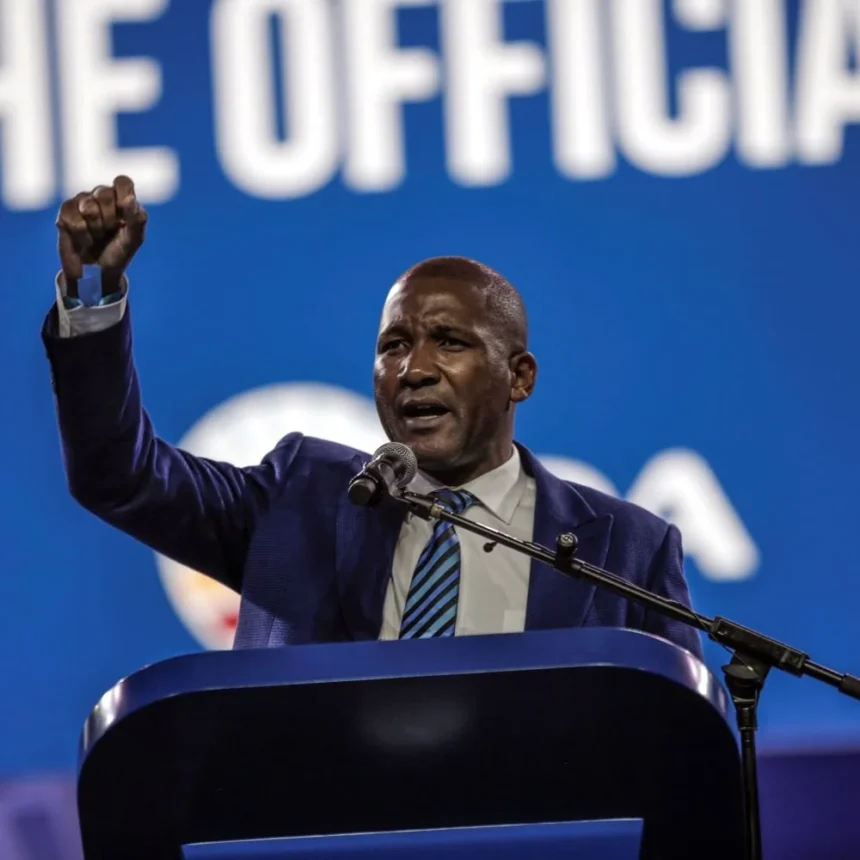Zebaldt Ngaruka
Paheja Siririka
President Nangolo Mbumba has applauded the conduct of Botswana’s recent parliamentary elections, which saw the ruling Botswana Democratic Party (BDP) conceding power to the opposition, Umbrella for Democratic Change (UDC).
BDP’s 58-year rule ended last Friday when the Independent Electoral Commission tallied the results, with the opposition UDC securing 31 out of 61 seats in parliament.
Botswana held general elections on 30 October 2024, and Duma Gideon Boko (55), leader of the UDC, became the sixth president of the landlocked country.
“I wish to congratulate president Duma Boko and the Umbrella for Democratic Change on their brilliant election to lead Botswana. I equally commend my dear brother president Mokgweetsi Masisi for promptly accepting the will of the people, and by committing to prepare an orderly and peaceful transition. Batswana deserve our collective praise for the peaceful general elections,” said Mumba in a statement.
He added that the ties between Namibia and Botswana were forged during the fight for independence, where many Namibians found shelter in their reliable neighbour during the war against German colonialism and apartheid occupation.
“Today, bilateral relations between Namibia and Botswana are characterised by stronger trade, commercial and people-to-people exchanges,” he added.
In its preliminary statement on 1 November, the Southern African Development Community (SADC) Electoral Observation Mission said the political and security environment during the elections was calm before and after voting.
The mission concluded that the 2024 general elections in Botswana “were conducted in a peaceful and orderly manner, where Batswana exercised their democratic right to vote.”
Popular Democratic Movement (PDM) president McHenry Venaani said the people of Africa have been for long taken for a ride by incumbent governments who used State resources to advance their greed.
“I received a call from president Boko, a good brother, to brief me on the situation of the election and eminent victory,” he added.
Venaani indicated that the high youth unemployment and suffering of many young people in Botswana are exacerbated by tenders which were awarded to the families of the president’s close allies, friends and family members, making citizens furious.
“I think the consequences of youth unemployment are that young people will vote against regimes, and as we are seeing, liberation movements are losing. They can no longer hold society after 30 years of promising,” he stated.
The lawmaker continued that liberation movements have become arrogant, telling people to create jobs for themselves.
“Critically, people are aware of their challenges, and are going to vote for change. This stimulates and gives momentum to opposition parties such as the PDM, which is the wish of people and parties, to do well. People have been suffering far too long from these liberation movements,” he said.
In a statement, Affirmative Repositioning (AR) spokesperson George Kambala observed that Batswana voted for the UDC because they realised that with politics, there comes a time when those who are unable to use the State’s power to meaningfully transform society and the lives of people, are to be voted out.
“This historic change is evident in SADC, whereby in May this year, the oldest liberation movement in Africa, the African National Congress (ANC), lost power in South Africa as it was reduced to a mere 40%, marking the end of its 30 years in power,” said the activist.
Kambala stated that both the ANC and the BDP were rejected by people because they failed to transform the economy, and better the lives and livelihoods of citizens.
Meanwhile, Landless People’s Movement (LPM)’s Lifalaza Simataa said the tides of change have arrived on the shores of Africa, adding that they are excited for the next chapter in Botswana’s politics with Boko at the helm.
“We further congratulate the citizens of Botswana for taking their democratic rights seriously, and going to the polling stations and voting for change,” he added.
He said a high voter turnout displays the will and desire for change by the people.
President Boko described his new role as a humbling responsibility.
“It is a responsibility one approaches with humility and some trepidation. I dare not fail and disappoint,” he said after taking the oath of office.
Boko is a jurist and lawyer, who studied at the University of Botswana and Harvard Law School, where he obtained a master’s degree in law.
He was born in Mahalapye, a town located in the Central District of Botswana, on 31 December 1969. In 2013, he married Kaone Boko, a lawyer who also manages her husband’s law firm.
(Botswana elections)
Caption:



